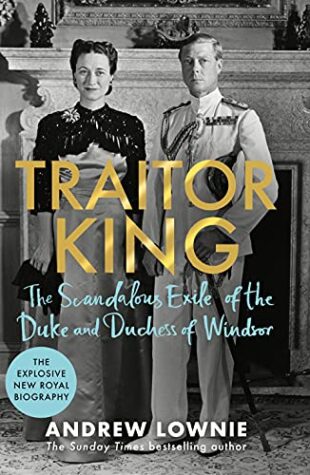 Traitor King: The Scandalous Exile of the Duke & Duchess of Windsor by Andrew Lownie
Traitor King: The Scandalous Exile of the Duke & Duchess of Windsor by Andrew Lownie Published by Blink Publishing on August 19, 2021
Genres: Biography, Non-Fiction
IndieBound
Goodreads
Drawing on extensive research into hitherto unused archives and Freedom of Information requests, it makes the case that the Duke and Duchess of Windsor were not the naïve dupes of the Germans but actively intrigued against Britain in both war and peace.
Anyone who has ever given a thought to the idea of romantic sacrifice knows the story of the Duke and Duchess of Windsor. David, the first son of George V of England, abdicated his throne shortly after he was coronated Edward VIII. This would be shocking today, but in the late 30s, it reverberated as the scandal of the time. Presumably, his only crime was falling in love with a twice-divorced American, Wallis Simpson. This book starts as the Duke of Windsor (his post-kingly title) was leaving his home for the last time to meet Wallis and start his new life. That is pretty much where the romance ends and real life, something neither of them were really equipped to handle, started
If you’ve watched the first season of The Crown, you know that the Windsor (née Saxe-Coburg-Gotha) family was less than thrilled with David and his decision, but by the time I finished reading, I was firmly of the opinion that his abdication was the best thing that could have happened to the Allied powers in WWII. You would have also seen, in that episode, photos of the real Duke and Duchess shaking hands and smiling with a bunch of literal Nazis, including Der Führer himself. (No, those photos were not fake.) Traitor King stands on its well-researched facts and presents the picture of two people who at the most were dangerous traitors and, at the least, a 1930s/40s version of the old SNL skit “Two A-Holes”. There is no doubt in my mind that the connection that Wallis had to high-ranking German officials and David’s more than passing curiosity about fascism made permission to marry Wallis about much more than the idea that the King could not marry a divorced woman. At the same time, there is something sad about the way they chose to carry on as not-quite-royals, never really seeing the good that could be done, but always looking back and taking what they thought was owed to them. I could go on and on about this book and the way it laid out the facts using a narrative style that exposed both the titillating and horrifying events of their lives, but I will just tell you that it is far from a piece of dry historical non-fiction. It’s not the romantic story I always envisioned, but the truth turns out to be much more consequential and interesting.



